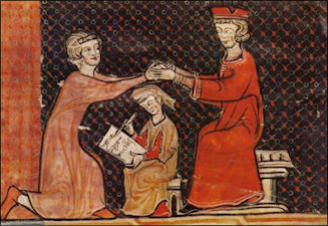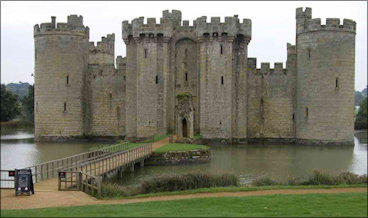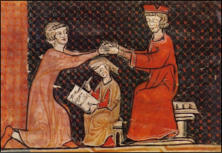



Feudalism
Origins
Feudalism was brought to England by the Normans. It was a system in common practice across Europe from the 9th century onwards, although the terms feudal and feudalism were not used at the time. It was based around three fundamental concepts: All those in the social hierarchy below the monarch and above the serfs (see Norman life), were referred to by the general term “vassal”. Serfs were not vassals as they did not swear allegiance; their loyalty was taken for granted and they could be punished for not honouring their obligations as tenants.Lord
A lord is any person who has “ownership” of land. From the top, all land is owned by the king. Below him will be the most senior lords who have been granted land rights by the king in return for swearing their loyalty to him. That loyalty is backed up by payments in service, goods, food and cash. This land is known as a “fief” or “fiefdom”. The senior lords in their turn can subdivide their fief, granting rights to lower lords or knights on a similar basis to that on which they obtained those rights from their overlord. The process can be repeated to several layers, depending on the size of the original fief and its capacity to support life.Vassal
A vassal is a person who has entered into a mutual obligation with an overlord or monarch, including military support and mutual protection, in exchange for privileges such as the grant of land held as a fiefdom. The vassal would pay “homage” to his overlord at a formal ceremony. This commitment was carried upward to include his overlord’s overlord, through to the monarch. In return for this loyalty, the overlord granted rights such as the use of land or other form of support. After the act of homage in which the vassal became his overlord’s “man”, the vassal then swore “fealty” in which he committed himself to providing services or other provisions as required by the overlord. The oaths of homage (from the French word for “man”) and fealty were taken as part of a religious ceremony, over a Bible or relic of a saint. Thus they were taken before God and carried great weight in the minds of all participants.Fief
Holding a fief did not confer what we would now think of as owning the freehold of a property on the vassal, only the usage rights. This enabled an overlord (at any level) to withdraw those rights should the vassal have, in some way, not honoured his obligations to his overlord. A fiefdom was normally awarded for the lifetime of the vassal (assuming they committed no crime in the eyes of the overlord). By the 12th century a fiefdom could be passed on to succeeding generations of a vassal, provided that the receiving lord repeated the oaths taken by his predecessor.

Lord
a person who has authority or power
over others.
Vassal
a person who has entered into a mutual
obligation to a lord or monarch.
Fief
heritable property or rights granted by an
overlord in return for allegiance or service.
© Walter Jardine 2016


Novel





Feudalism
Origins
Feudalism was brought to England by the Normans. It was a system in common practice across Europe from the 9th century onwards, although the terms feudal and feudalism were not used at the time. It was based around three fundamental concepts: All those in the social hierarchy below the monarch and above the serfs (see Norman life), were referred to by the general term “vassal”. Serfs were not vassals as they did not swear allegiance; their loyalty was taken for granted and they could be punished for not honouring their obligations as tenants.Lord
A lord is any person who has “ownership” of land. From the top, all land is owned by the king. Below him will be the most senior lords who have been granted land rights by the king in return for swearing their loyalty to him. That loyalty is backed up by payments in service, goods, food and cash. This land is known as a “fief” or “fiefdom”. The senior lords in their turn can subdivide their fief, granting rights to lower lords or knights on a similar basis to that on which they obtained those rights from their overlord. The process can be repeated to several layers, depending on the size of the original fief and its capacity to support life.Vassal
A vassal is a person who has entered into a mutual obligation with an overlord or monarch, including military support and mutual protection, in exchange for privileges such as the grant of land held as a fiefdom. The vassal would pay “homage” to his overlord at a formal ceremony. This commitment was carried upward to include his overlord’s overlord, through to the monarch. In return for this loyalty, the overlord granted rights such as the use of land or other form of support. After the act of homage in which the vassal became his overlord’s “man”, the vassal then swore “fealty” in which he committed himself to providing services or other provisions as required by the overlord. The oaths of homage (from the French word for “man”) and fealty were taken as part of a religious ceremony, over a Bible or relic of a saint. Thus they were taken before God and carried great weight in the minds of all participants.Fief
Holding a fief did not confer what we would now think of as owning the freehold of a property on the vassal, only the usage rights. This enabled an overlord (at any level) to withdraw those rights should the vassal have, in some way, not honoured his obligations to his overlord. A fiefdom was normally awarded for the lifetime of the vassal (assuming they committed no crime in the eyes of the overlord). By the 12th century a fiefdom could be passed on to succeeding generations of a vassal, provided that the receiving lord repeated the oaths taken by his predecessor.

Lord
a person who has authority or power
over others.
Vassal
a person who has entered into a mutual
obligation to a lord or monarch.
Fief
heritable property or rights granted by an
overlord in return for allegiance or service.




















